Dirty Projectors: the interview
‘As infinite as my imagination’: Dave Longstreth talks ‘Swing Lo Magellan’
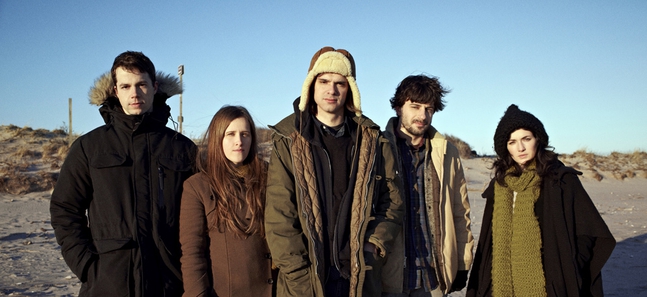
Photo by Jason Frank Rothenberg
Posted: Fri Jun 29 2012
Some bands vault straight into the big leagues of the indie music scene; others get there more gradually. In the case of Dirty Projectors, the shifting troupe of indie brainiacs led by Yale dropout Dave Longstreth, it took them five albums. 2009's Bitte Orca – a glittering confection of R&B rhythms, West African guitar figures and complex vocal arrangements – may have been the first of the group's records to attract widespread acclaim, but it was just the latest in a series of audacious experiments that included a loose reimagining of Black Flag's Damaged (Rise Above) and a glitch-orchestral opera based around Don Henley, oil and ancient Mexico (The Getty Address).
After touring the bejesus out of the album and recording an EP about whales with Björk (as you do), Longstreth retreated to a house in upstate New York and began a marathon songwriting session that would yield the songs on new LP Swing Lo Magellan, released this July. Culled from 40-odd finished demoes, it's one of the group's most accessible records to date, although that's not to say that they've reined in the weirdness. 'It's just more about the content, in the old-fashioned sense,' says Longstreth. 'It's more about the words, and the melodies, than it is about the plumage.'
We're meeting in May, at the tail end of a week-long, continent-straddling PR blitz for the album, the rigours of which might explain why Longstreth dons a pair of sunglasses at the start of the interview and only takes them off once we're finished. Or maybe that's just one of his things; while his reputation as a tricky interviewee is undeserved, he does at times resemble the brilliantly precocious teen protagonists of David Foster Wallace's Infinite Jest, forever slightly disconnected from an outside world that's struggling to keep up.
How many of these interviews have you done so far?
Everybody seems to be treating me like I'm at the end of my wits today!
I always feel that it must be quite a weird experience, when you're sat in a room all day, doing these...
It is, very surreal. It began six days ago – two days in London, a day in Berlin, a day in Paris, a travel day, here yesterday, and probably about eight or nine hours a day for each of those days, and every interview's half an hour. So… sixteen a day, about, times five… five times sixteen… five… fifty… wait a minute. [Laughs] And for a while it's really good, because it really allows you to clarify your ideas, and then it gets to that point where your brain is like dur-dur-dur-dur-dur.
Do you ever lose track of what your ideas were in the first place?
I'm a very linguistic person, you know? It gets to the point where I'm starting to literally perform the same semi-colons, but then I try to just say the thought in different language, to keep it fresh, even though I feel like the first way I got it is probably the realest and most succinct. I'm just kind of playing madlibs with my own ideas, to the point where I'm like, 'What are we fucking talking about?' But I'll try not to do that right now.
Have you ever seen a quote of yours in print that was actually accurate, but you had no idea how you would come out with something like that?
Yes. Yes I have. [Laughs] But I've also seen a lot of misprinted things, so… You just have to hope that by doing enough [interviews], there's a game of averages: your basic vibe and intentions are going to make it out alive.
Listening to Swing Lo Magellan, it felt like there was a certain tension between the exuberance of the music and what the lyrics were doing – on 'About to Die', for instance. Were you conscious of it lyrically being a darker album than the last one was?
The process of writing all the songs was pretty intuitive – it wasn't very self-conscious, amazingly. I got into this headspace where I was just writing songs, and not really thinking about whether any one song was notable or a pile of shit – but just getting the idea out that I had, and then [moving] onto the next one. It allowed me not to think about things very much, which is really awesome. I mean, eventually it occurred to me that it's a much darker collection of feelings and thoughts. I know what you mean about the music being exuberant, and I think it just comes down to something fundamental in the temperament of the writer, and… you know, a philosophical disposition. But, yeah, it's an interesting tension, just to notice it. I didn't judge it, I just let it be there.
I saw The Flaming Lips at a festival last weekend, and of course they finished with 'Do You Realize?'. It's kind of the same idea, I guess – in some ways it's a very dark lyric, and in some ways it's quite uplifting.
Yeah, I mean… that's just a fact, you know? That we're all about to die. And it doesn't need to be greeted with bleakness: it's probably best to greet it with a kind of exuberance.
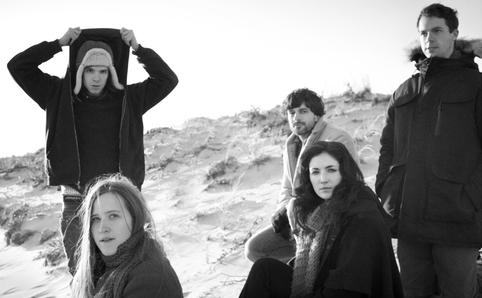
Dirty Projectors (from left): Dave Longstreth, Amber Coffman, Nat Baldwin, Haley Dekle, Brian McOmber. Photo by Jason Frank Rothenberg
With the sheer volume of songs that you were writing at the beginning of the album – had you ever actually worked like that before?
No. I always like to do things different from what I did before. Things like Rise Above and Getty Address and Mount Wittenberg Orca are all these kind of self-contained worlds where, when you're done telling the story or you're done fulfilling the conceptual gambit, then you're done writing the music. And this was different, just because it was open-ended, so it was kind of as infinite as my imagination was – which is a fucking awesome place to be, you know? That was the most fun I've had in any kind of music-related thing in my life. It was just thrilling to be in that place. I feel like I got through a lot of stuff – as a writer, but as a person as well, just in writing all these songs. It was good, a good period.
When you were actually choosing the songs that ended up on the record, was it kind of a question of you throwing the material out to the band and seeing which worked the best?
Yeah, definitely. I definitely relied on everybody in the band a lot, to kind of edit – say 'These songs are good, these ones go well together' – and also just figure out which ones sounded good when we played them, you know? The songs just sort of started organizing themselves, started running in packs. I don't think these are even necessarily the best songs – they're all really good, but there are also really good ones that aren't on the album. I'm psyched to play those live and put those out at some point.
As a whole, the album feels looser and less tightly controlled than Bitte Orca was. Would you agree with that?
I would, I would. For me, it's just a collection of little moments, you know? It kind of reflects the way it was written and recorded, which was pretty casually, and pretty constantly. I think so much music that gets recorded now is so squeaky clean, it's so digital and perfect. You know, I imagine that when it was difficult to demonstrate a mastery of a craft, perfection was an impressive feat, but with these deskilling ideologies of Warhol and punk, and then these enabling technologies of ProTools and all that, it's really, really easy to get your idea across. And it's kind of more interesting to smudge it a little bit. Um… at the same time, I'm not really interested in the kind of smudge that's like obscuring… Yeah, I guess 'smudge' is actually totally the wrong word, because I'm not trying to really obscure the ideas, so much as underscore them with the assist of a moment. It really happened: this is what we did. It's not perfect, but this is how we did it.
I loved that song ['Unto Caesar'] where you suddenly hear the conversation that was going on in the studio while you were recording the vocals.
Yeah, yeah. The album is full of those moments, whether it's dropping a snare beat here or there, or just the vocals are pretty raw. A lot of the vocal takes, it's the first time I ever sung the song out loud; 'Impregnable Question', that's the only time I've ever sung that song. I've sung that song once in my life.
So are you going to do it live, or is it purely for the record?
Well, it's just such a personal song, and it's on the record just because everyone that I trust insisted that it would be. I think we'll probably try to do it live, but… yes, it'll be crazy.
I was intrigued by that interview that you did with Spin last year, saying 'Maybe That Was It' was a response to The Strokes' This Is It…
Well, you have to understand: with the goal of just writing songs, as opposed to these elaborate conceptual things, what I want to do is just put it in the song – put everything into the song, the song does everything. So, in a way, there's really nothing to talk about. The interview with Spin is just this series of jokes. I didn't think anybody would take that seriously.
I think everybody did…
I think everybody did, too. Which is why half of what I'm talking about in these interviews is the fact that these songs, you don't talk about them: you play them and you listen to them. But the song is this irreducible thing.
Do you ever get people coming back to you with their own interpretations of your songs that are completely not what you would've expected?
Yeah, but a song is open. A song's not a law. Even laws are open to interpretations, but then there are courts to determine which is the correct one. A song is different, you know? You're entitled. Which is why I feel like I'm entitled to make these jokes about them as well. [Pauses] I may be entitled, but it may be retarded of me to do so.
'The Gun Has No Trigger' confused me the first time I heard it: there's a really old-school soul feel to the groove, but then the melody goes in a totally unexpected direction. Is that the melody that came to you, or would you actually rework something – maybe if the first idea seemed too obvious…
Oh, right – and then you tweak endlessly? Nah. Tweaking endlessly sounds like you tweaked endlessly. I don't really do that any more. I used to. The first thought is usually the best thought, and it takes a minute to find the first thought, and it takes a certain amount of concentration to follow it through to the end. Sometimes it's not a perfect transcription, or you don't quite get it and it sounds a little fucking awkward. But that melody, I wrote it pretty quickly – just, you know, in one sitting. It took me forever to write the words, though. I couldn't figure out what the melody suggested, what it was supposed to be about.
So is that normally the order that you do stuff in?
You know? I think it generally happens that way. There aren't any laws, and I like to fuck it up just to keep things fresh and open. If I'm not starting that way, I'll generally start from a beat, or sometimes have a melody that I just come up with walking around, and then I find the chords for it. I very rarely start with words – it's happened, but not as much.
Out of interest, did you read that article in the New Yorker a few months ago…
[Immediately] Ester Dean? Yeah, yeah.
As a songwriter, how did that strike you?
Well that's the way I write songs. Yeah, when I'm writing from a beat, that's totally it. You just kind of get in there with it, you feel like you're doing something crazy… When you're making up a melody, there are vowels that go with the notes: it took me an absurdly long time to realize that those are absolutely the key to figuring out the content of the song. Those vowel sounds are true, you know what I mean? And you totally have to find words that find the vowel – it's this other level. When you're writing in iambic pentameter or something, you have to find words that are in that meter, and it's like when you're writing song lyrics to a melody that you've written, they need to match the vowel sounds that are the very first ones that you hear, otherwise the idea's fucked. For me, that's part of what was so exciting about writing these songs – really exploring ideas like that, and really taking on the craft of it and the discipline of it, to follow that shit through. And then you do it enough times and it kind of becomes instant; it becomes part of the language that you speak when you're doing it or whatever. It was so cool, I'm so glad that I did it. And yeah, I think it makes these songs very clearly the best ones that I've ever made.
When you went to that house in upstate New York, was there a sense of a need to decompress after all the touring?
Yeah, totally. New York isn't a terribly relaxing place to come back to. It's a great place to hang out with your friends, and to take in everything that's happening there, but it's never really good for sitting down and writing – you know, connecting with some sort of weird interior. It's just not that kind of place. With the internet, everything, putting out music is so narrative-driven: 'How did they do it?' 'Where did they go?' But that shit is not very interesting. Yeah, the house we stayed, it was a cool place to hang out for a while and it was a nice counterpoint to all the touring that we did for a really long time, but I don't associate [the album with] any 'romance of upstate New York'.
You don't want that to be what ends up defining the album?
I mean, people can do what they want to. But for me it's just about the songs.
Out of interest, do you ever get people singing along at shows?
Yeah, it happens all the time.
Does it work?
Well, I don't know. They're not soccer anthems, you know what I mean? But it works in the sense of… yeah, it feels like a collective embodiment of the music. It's incredible. You wouldn't expect it: leaping fifths and octaves, doing weird shit.
And do you get many people dancing?
Yeah, it depends on the song – and depends whether we're doing a good job or not. But yeah, people dance. I love that.
'Swing Lo Magellan' is released on July 10 (import) and July 18 (domestic) via Hostess Records. Dirty Projectors play at [Asagiri Jam], October 7; Shibuya O-East, October 9
Tweets
- About Us |
- Work for Time Out |
- Send us info |
- Advertising |
- Mobile edition |
- Terms & Conditions |
- Privacy policy |
- Contact Us
Copyright © 2014 Time Out Tokyo










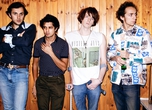
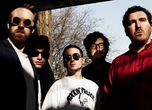
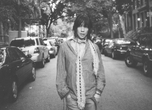
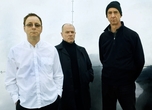
Add your comment